
Discontinuing lenalidomide after 3 years of MRD negativity shows low relapse rates in multiple myeloma, offering hope for treatment-free remission.

Discontinuing lenalidomide after 3 years of MRD negativity shows low relapse rates in multiple myeloma, offering hope for treatment-free remission.

AI is transforming oncology by enhancing clinical trials, personalizing treatments, and improving pharmacy practices, promising faster, more precise cancer care.
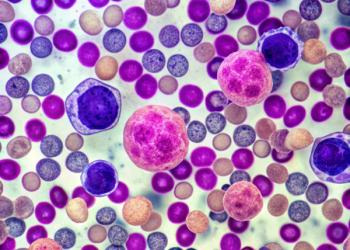
Sundar Jagannath, MBBS, highlights pharmacists’ expanding role in managing linvoseltamab’s immunologic profile, supporting adverse event response, and advancing multiple myeloma care.

Eileen Peng, PharmD, discusses how her team has restructured pharmacy services to support outpatient administration of CAR T-cell and bispecific therapies—emphasizing multidisciplinary collaboration, early toxicity management, real-world data integration, and pharmacist-led care transitions to ensure safety and continuity across care settings.

Two pharmacy leaders at UNC Health share how their distinct yet complementary leadership journeys and skill sets are driving innovation in clinical practice, education, and team development across the health system.

LeAnne Kennedy, PharmD, BCOP, CPP, FHOPA, FASTCT, discusses the collaborative culture, research opportunities, and leadership pathways that define oncology pharmacy practice at Atrium Health Wake Forest Baptist, while emphasizing the importance of advocacy and visibility for the profession.

Lawmakers across the country can learn from examples in states like Arkansas and Texas.

Pirtobrutinib shows promising results in a head-to-head trial against ibrutinib for chronic lymphocytic leukemia (CLL)/small lymphocytic leukemia (SLL).

Hormonal contraceptives present a nuanced risk-benefit profile, slightly increasing breast and cervical cancer risk while significantly reducing ovarian and endometrial cancer rates.
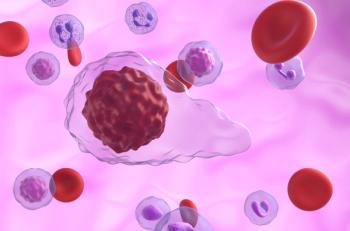
Luspatercept shows promise in reducing transfusion dependence for myelofibrosis-associated anemia, despite not meeting primary trial end points.

Kevin Chen, PharmD, MS, BCOP, CPP; and Amanda Cass, PharmD, BCPS, BCOP, share key insights about ROS1, non-small cell lung cancer, and the newly approved drug taletrectinib.
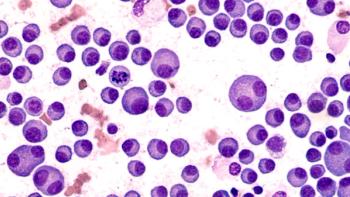
Sundar Jagannath, MD, MBBS, discusses how linvoseltamab’s streamlined step-up dosing and REMS program support broader use in community settings and improved tolerability for older patients.

Emerging trial results reveal gedatolisib significantly enhances progression-free survival (PFS) in advanced HR+/HER2- breast cancer.
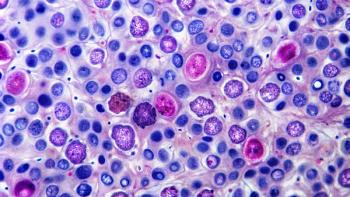
Julio C. Chavez, MD, MS, discusses the distinct pharmacologic profile, clinical activity, and outpatient potential of golcadomide plus rituximab in relapsed/refractory follicular lymphoma, highlighting its selective cereblon modulation, fixed-duration dosing, and promising efficacy in heavily pretreated patients.
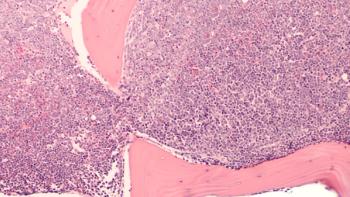
Julio C. Chavez, MD, MS, discusses updated data from the European Hematology Association (EHA) 2025 Congress on the investigational oral CELMoD agent golcadomide (GOLCA) plus rituximab in relapsed/refractory diffuse large B-cell lymphoma (R/R DLBCL).

Durvalumab continues to demonstrate efficacy in a variety of cancers, with new data from the phase 3 MATTERHORN trial solidifying its use with chemotherapy in gastric cancer.

George Wang discusses the widespread financial barriers patients with cancer face, the environmental and economic toll of oncology drug waste, and how pharmacist-supported medication donation programs can safely and legally redistribute surplus cancer treatments to patients in need.

The combination regimen had stronger benefits in patients with locally advanced or metastatic epidermal growth receptor-mutated (EGFRm) non–small cell lung cancer (NSCLC) than osimertinib alone.
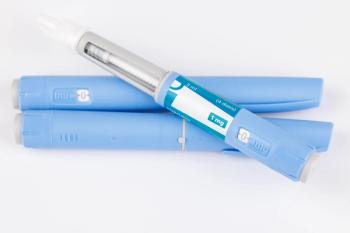
GLP-1 receptor agonists show promise in improving survival rates for older patients with cancer who have type 2 diabetes (T2D), highlighting their potential in oncology.

Targeting BRD4 with BET inhibitors shows promise in reversing immune suppression by myeloid-derived suppressor cells in chronic lymphocytic leukemia.

Trastuzumab deruxtecan shows promising efficacy in treating HER2-positive metastatic breast cancer with brain metastases, offering hope for challenging cases.

Sundar Jagannath, MD, MBBS, explains how linvoseltamab showed strong efficacy and tolerability in the LINKER-MM1 trial, making it an appealing option for older patients with relapsed or refractory multiple myeloma (MM).

Immense burden is laid upon patients with cancer who are infected with COVID-19, as they are at higher risk of experiencing cancer treatment disruptions and severe illness that necessitates hospitalization.

Eugene Przespolewski, PharmD, BCOP, DPLA, shares insights from his presentation at the 2025 OPC meeting in Austin, Texas.

Artificial intelligence (AI) is rapidly transforming oncology by enhancing clinical trial design, streamlining patient recruitment, improving precision medicine, and optimizing pharmacy operations, while raising important challenges around data ethics, bias, and integration into clinical workflows.

Carrie Harney, JD, of US Pharmacopeia (USP) discusses how proposed tariffs could impact generic drug supply chains, sterile injectable shortages, and pharmacy operations, underscoring the need for policy incentives and manufacturing diversification.

Sundar Jagannath, MD, discusses how prophylactic tocilizumab reduced cytokine release syndrome incidence and severity with talquetamab in relapsed or refractory (R/R) multiple myeloma.
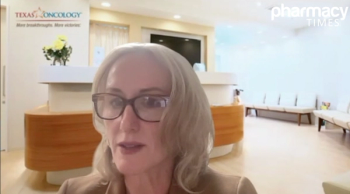
Debra Patt, MD, PhD, MBA; and Houston Holmes, MD, explore how the removal of risk evaluation and management strategies (REMS) for chimeric antigen receptor (CAR) T-cell (CAR T) therapies can improve health equity, expand access in community settings, and elevate the pharmacist’s role in care coordination.

The complete response letter (CRL) did not raise safety concerns, but stated the IGNYTE trial was inadequate and did not provide substantial evidence of effectiveness.

With AI-enhanced pharmacogenetics, pharmacists lead the shift to truly individualized medicine.